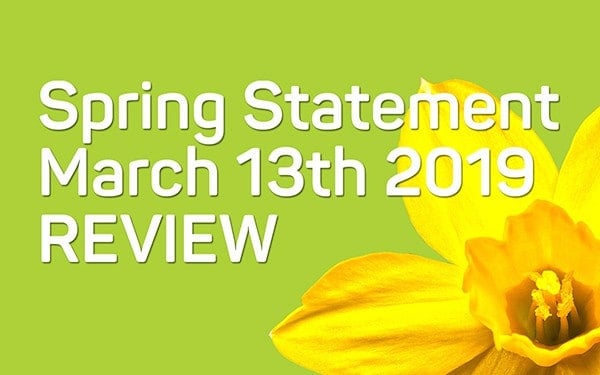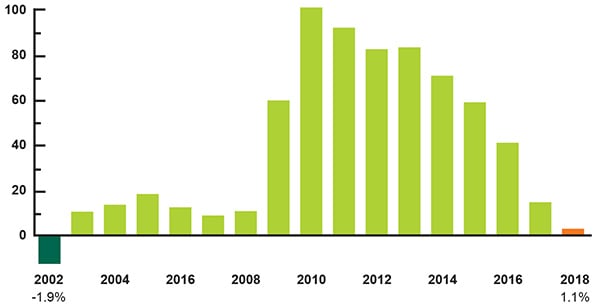
Spring Statement 2019 Review
Posted on 21st March 2019 by Phil Ainley
There were two main conclusions drawn from the Chancellors Spring Statement on March 13th.
Firstly, we received confirmation that the economy is expected to weaken in 2019.
The Office for Budget Responsibility (OBR) revised its forecast for growth down to 1.2%, from the 1.6% prediction in the October Budget.
The signs are already evident. International market-leading motor companies are pulling their production out of the UK and major UK construction companies are falling into administration seemingly at a rate of one per week. The latter being a worrying point as the construction industry is widely seen as an indicator of when a recession will bite.
Secondly, was a more positive viewpoint that public finances continue to strengthen. The budget deficit this year is now expected to be 1.1% of Gross Domestic Product (GDP). That’s the narrowest it’s been since 2002 when there was surplus of 1.9%, and a significant turnaround from 2010 when the budget deficit was a whopping 6.9%.
This should give the Chancellor some flexibility to increase spending on public services in the Government Spending Review later in 2019. Indeed, £100million has already been made immediately available to the police to tackle the rise in knife crime.
The only caveat to this (and to everything in the near future) is BREXIT. With recent votes going against the government’s plans for BREXIT, the UK looks like it could crash out of Europe without any kind of deal at all.
A no-deal BREXIT could cause growth to slow down even further, or even stop growth altogether, and prompt the chancellor to announce new fiscal spending to ensure the UK economy is sufficiently supported.
This would go against his preference to deliver an autumn budget rather than an emergency package to mitigate the pain of a no-deal BREXIT.

What else did we learn from the Spring Statement?
Economy:
It’s taken a while and has meant the country suffering hardship for a number of years, but the government’s plans to build a stronger and fairer economy are beginning to show positive results.
The overall economy remains resilient and forecasts are for continued growth.
- After 9 years of continued growth, the OBR has forecast further growth for 2020.
- The UK economy has grown faster than that of France, Italy and Japan since 2010.
- Inflation is expected to stay close to the government’s 2% target.
- Increased business investment is forecast from 2020, once companies know where they stand in the post-BREXIT era.
Public Finances:
Thanks to the government’s hard work, and the stretched’ patience of the British public, the public finances are starting to look a lot better.
- Debt fell last year and is forecast to fall continuously to 73% of GDP by 2023/24. This is compared to a peak of 85.1% in 2016/17.
- Borrowing has been reduced by 80% since 2009/10.
- The government is focused on continuing to reduce the national debt so as not to burden the next generation.
- The government will continue to invest in public services, economy and infrastructure, while also balancing the reduction of the UK’s debt.
Employment:
- Wages are increasing at their fastest pace in over a decade and are forecast to grow faster than the rate of inflation.
- Unemployment stands at 4%, which is the lowest rate since 1975, with the OBR forecasting it to remain low for the next five years. How much of this is due to the creation of new jobs or down to the increase of the self-employed workforce is unclear.
- What is clear is that there are 3.5million more people in work than there was in 2010.
Future investment in housing and infrastructure:
At the Autumn Budget 2017, the government set out new policies to raise housing supply by the end of this Parliament to its highest level since 1970.
It is on track to reach 300,000 a year on average.
The Spring Statement set out further steps to deliver this ambition:
- The government published a consultation on Infrastructure Finance, seeking views on how the government can best support private infrastructure investment.
- Reiterated the government’s commitment to publishing a comprehensive National Infrastructure Strategy.
- Through the Affordable Homes Guarantee Scheme, the government will guarantee up to £3 billion of borrowing by housing associations in England to support delivery of around 30,000 affordable homes.
- £717 million to unlock up to 37,000 homes at sites including Old Oak Common in London, the Oxford-Cambridge Arc and Cheshire. Plus a further £445 million to unlock over 22,000 homes, and a joint declaration with local partners, affirming our shared vision for the Arc.
- up to £362 million UK Government funding into the Borderlands area.
Education and skills:
The Budget set out steps to equip people with the skills to succeed in the modern economy, with the Chancellor announcing the following;
- Updates to apprenticeship reforms that mean from April 1st employers will see the co-investment rate they pay cut by a half from 10% to 5%.
- Levy-paying employers are able to share more levy funds across their supply chains, with the maximum amount rising from 10% to 25%.
- Tackling the issue of ‘period poverty’, the Department for Education will lead work to develop a national scheme in England to provide free sanitary products to girls in secondary schools.
Spending Review 2019:
The government will hold a Spending Review later in 2019, which will conclude alongside the autumn Budget.
The Spending Review will set departmental budgets, including 3-year budgets for resource spending, provided the UK leaves the EU with a BREXIT deal.
The government’s review of capital spending will involve looking at each project from the bottom up, to ensure maximum return for the country.
The Spending Review will focus on the outcomes achieved for the country and the return on investment. The focus will be on supporting a high-growth economy with public services that work for everyone.
For more in-depth analysis of the Spring Statement, see the Gov.uk website.
Related Articles:
Key events and trends that are going to shape your world in 2019
Green Cards required by UK drivers in light of a no-deal BREXIT
